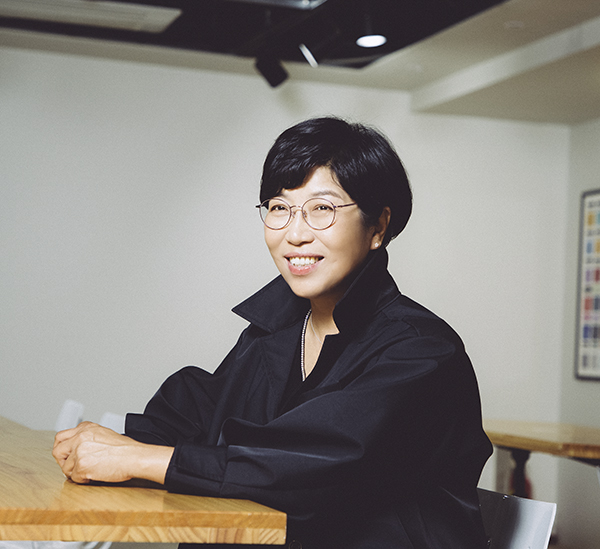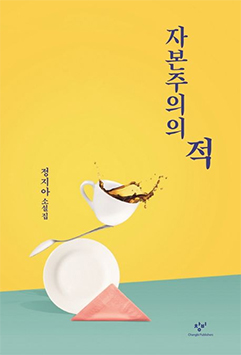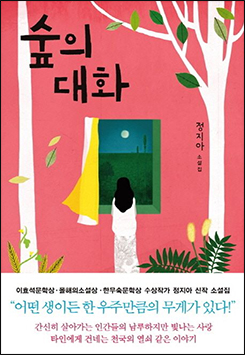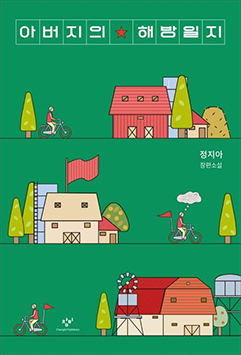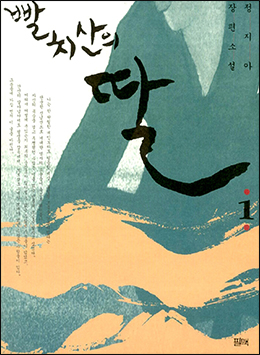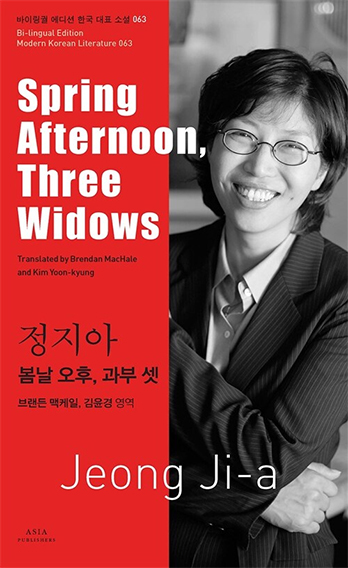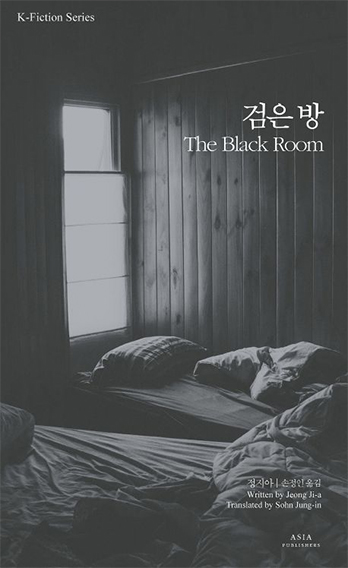|
Korean Authors
Writer Jeong Jia Embodying the Beauty of Life
2023.01.02
You can find various lives in writer Jeong Jia’s stories. For writer Jung, who reflects various shapes of life through a warm gaze toward people, novels are a medium to express the beauty she finds in life. Returning with Father’s Liberation Diary (Changbi Publishing), a full-length novel after 32 years, she has been receiving great love from people for her unique savourable expressions and witty sense of humor, lightening the mood of the heavy story. Following is an interview with writer Jung, who has been shedding light on various corners of people’s lives and historical events.
ⓒ Kang Min-gu

It is an honor to have you on K-Book Trends. Please introduce yourself to our subscribers.
Hello, everyone. My name is Jeong Jia. I occasionally write novels while living at the foot of Jirisan Mountain with my mother, who is almost 100 years old, as well as four cats and two dogs. It’s good to see you all.

Your Father’s Liberation Diary, published in September, became a bestseller. It has become so popular that it was introduced in major media. You must have special feelings as it was a full-length novel you published after 32 years. How do you feel?
I’m bewildered. I just wrote the way I always would, but so many people liked it. It made me happy, but at the same time, I felt somewhat overwhelmed to write better stories in the future.

You have also written a lot of short stories, such as Enemy of Capitalism (Changbi Publishing) and Talk with the Forest (EunHaengNaMu Publishing). However, as your recent book is a full-length novel released after such a long time, was there any difficulty writing it? We are also curious to know the difference between writing a full-length novel and a short novel.
For full-length novels, it is difficult to take the first step. For this one, too, I paused often while writing it as I had to check whether the sentences or the organization were losing compactness compared to short stories. I’m also a person who cares about rhyme in sentences. So, at times when I felt that the story was loosening because I gave more strength to the sentences, I had to take the time to fix them.
Enemy of Capitalism, Talk with the Forest, Father’s Liberation Diary, and The Partisan’s Daughter

The book Father’s Liberation Diary is an extension of The Partisan’s Daughter (Philmac), published in 1990, but it seems that the atmosphere has become lighter. Just like our society is changing little by little, did you have changes in how you think by any chance? Also, is there a secret to keeping the right balance so that the atmosphere of your books is not too heavy or too light?
Of course. The world has changed, and so have I. The thing I was concerned about the most was, “Who would be interested in North Korean partisans in this era?” Well, the book is not about them, it is about a father. But, still, the father was a former partisan. So, I set up a number of strategies, which were “write as light and rhythmically as possible” and “distance the main character and the father as much as possible.” I think they helped.

Various historical incidents can be found in parts of your works. Is there a particular reason for writing stories about history?
Well, it is because my parents were at the center of history. And, my hometown Gurye in the province of Jeollanam-do, had been the center of ideological conflict from the Yeosu-Suncheon rebellion until the end of the Korean War. Even people who had no interest in history or ideology were swept away by this torrent, and I grew up listening to their stories from a very young age. So, I couldn’t help but be interested in how history affects people’s lives (for the better or for the worse).
My interest in history grew naturally as my hometown and parents were at the center of history.

Spring Afternoon, Three Widows (Asia Publishers), and The Black Room (Asia Publishers) are based on historical events that happened in Korea. These two books have one thing in common: both Korean and English versions were published together. What message did you want to deliver to overseas readers through the books?
I don’t write novels to give a “message.” I just express the beauty of the life I’ve discovered. If someone reads my story and recognizes that beauty, I can’t be happier. I think people’s lives are not that much different from one another, wherever you are or whatever race you are. Aging is getting old towards death. And how can one console that melancholy? Can the fact that life in any remote rural Asian country beyond the sea is not very different from life in London or New York be a bit comforting?
Spring Afternoon, Three Widows and The Black Room

When the two books were translated, you must have paid special attention to the perspective towards history and cultural differences. Your sense of humor and dialect expressions work as the icing on the cake in your stories, but it might have been difficult for overseas readers to have the same impression due to the linguistic barrier. So, what points do you need to keep in mind when translating your books to convey the impression as intact as possible?
We had no idea about the dialects. So, we took up the courage to give up on them. No matter how you bring the dialects from certain regions of the UK or the US, the unique taste of the Jeolla-do dialect will not be felt. The translators also had the hardest time with the dialect part, and as there was no other way, we decided to give up. I don’t quite know the difficulties of translation, but I think one must have an accurate understanding of the intention and the unique colors of the writer to properly translate a work.

Is there any other book of yours other than the two books that you want overseas readers to read?
Well, all of my books, I guess? (laughs) I think my recent book Father’s Liberation Diary, would be a good book for readers in other countries as it is the story of a daughter growing to better understand her father.

As your book Father’s Libration Diary became popular, you also participated in the “Literature Week 2022” hosted by the Arts Council Korea. What was it like to be meeting the readers in person?
Honestly, I don’t feel very comfortable meeting readers in person. It is because the spoken language is more direct and less delicate than the written language. So, it is not easy to deliver exactly what’s on my mind. I’m a shy person, too. But, one thing for sure is that I could have a better understanding of readers’ preferences as I could feel their energy and direct response.
I feel most happy when people read my books and recognize the beauty I discovered.

Do you have plans to write another full-length novel? What kind of story do you want to share with people in the future? Please tell us about your plans or goals.
I have been mapping out some full-length novels. There is one that is almost finished, which is the story of a mother. Living with a 97-year-old mother, I get to watch her life clock tik-tok towards death. I believe that the story of life and death would be my best representation in the books to come. I would also like to write a saga about Korea’s modern history, delightfully written like Father’s Liberation Diary.
#Jeong Jia#Novelist#Father’s Liberation Diary#The Partisan’s Daughter |
Pre Megazine
-

Jakkajungsin Publishing Co.
VOL.69
2024.04 -

Writer Yun Jung-Eun
VOL.69
2024.04 -

Jumping Books Publishing House
VOL.68
2024.03 -

Writer Kim Hwa-Jin
VOL.68
2024.03 -

Publisher Hyohyung
VOL.67
2024.02 -

Writer Minha
VOL.67
2024.02 -

Almond Publishing
VOL.66
2024.01 -

Writer Kwon Jung-Min
VOL.66
2024.01 -

Hakgojae Publishers
VOL.65
2023.12 -

Writer Kim Hye-Jung
VOL.65
2023.12 -

Eidos Publishing House
VOL.64
2023.11 -

Writer Hwang In-Chan
VOL.64
2023.11 -

Munhakdongne
VOL.63
2023.10 -

Writer Chang Kang-myoung
VOL.63
2023.10 -

Happywell Publishing
VOL.62
2023.09 -

Writer Baik Soulinne
VOL.62
2023.09 -

Dasan Contents Group (Dasan Books)
VOL.61
2023.08 -

Writer Lim Kyoung-Sun
VOL.61
2023.08 -

SpringSunshine Publishing Co.
VOL.60
2023.07 -

Writer Lee Kyung-Hye
VOL.60
2023.07 -

Human Cube
VOL.59
2023.06 -

Doctor Jeong Jae-Seung
VOL.59
2023.06 -

Anonbooks
VOL.58
2023.05 -

Writer Son Bo-Mi
VOL.58
2023.05 -

Namhaebomnal
VOL.57
2023.04 -

Writer Kim Bo-Young
VOL.57
2023.04 -

Hugo Publishing
VOL.56
2023.03 -

Writer Cho Kwang-Hee
VOL.56
2023.03 -

Balgeunmirae Publishing Co.
VOL.55
2023.02 -

Writer Lee Byung-Ryul
VOL.55
2023.02 -

Wisdom House, Inc
VOL.54
2023.01 -

Writer Jeong Jia
VOL.54
2023.01 -

Humanitas
VOL.53
2022.12 -

Writer Kim Yeon-Su
VOL.53
2022.12 -

Songsongbooks
VOL.52
2022.11 -

Writer Eun Hee-Kyung
VOL.52
2022.11 -

Bombom Publishing Co.
VOL.51
2022.10 -

Writer Jiwon Yu
VOL.51
2022.10 -

Hangilsa Publishing Co., Ltd.
VOL.50
2022.09 -

Writer Kim Won-Young
VOL.50
2022.09 -

Moksu Publishing Company
VOL.49
2022.08 -

Writer Yoo Sun-Kyong
VOL.49
2022.08 -

Next Wave
VOL.48
2022.07 -

Writer Park Sang-Young
VOL.48
2022.07 -

A Thousand Hopes
VOL.47
2022.06 -

Writer Bora Chung
VOL.47
2022.06 -

Woongjin ThinkBig
VOL.46
2022.05 -

Dr. Oh Eun-Young
VOL.46
2022.05 -

JECHEOLSO Publishing House
VOL.45
2022.04 -

Writer Jang Ryu-Jin
VOL.45
2022.04 -

Changbi Publishers
VOL.44
2022.03 -

Writer Kim Ho-Yeon
VOL.44
2022.03 -

Mati Books
VOL.43
2022.02 -

Writer Lee Kkoch-Nim
VOL.43
2022.02 -

Picturebook Gongjackso
VOL.42
2022.01 -

Writer Kim Sang-Wook
VOL.42
2022.01 -

Writer So-yeon Park
VOL.42
2022.01 -

Writer Yoo Eun sil
VOL.42
2022.01 -

Kungree Press
VOL.41
2021.12 -

Writer Kim Lily
VOL.41
2021.12 -

Writer Park Yeon-jun
VOL.41
2021.12 -

Writer Yi Hyeon
VOL.41
2021.12 -

A deeper world told through picture books 'Iyagikot Publishing (Story Flower)'
VOL.12
2019.06 -

Author Jeon Min-hee
VOL.12
2019.06 -

Illustrator Kim Hwan-Young
VOL.13
2019.07 -

Travelers sailing through the sea of knowledge - 'Across Publishing Group Inc.'
VOL.13
2019.07 -

Genre Novel Publisher 'Arzak Livres'
VOL.14
2019.08 -

Author Lee Yong-han
VOL.14
2019.08 -

Wookwan Sunim
VOL.15
2019.09 -

East-Asia Publishing
VOL.15
2019.09 -

Author Jo Jung-rae
VOL.16
2019.10 -

EunHaeng NaMu Publishing
VOL.16
2019.10 -

Writer Heo Kyo bum
VOL.40
2021.11 -

Writer Kim So-Young
VOL.40
2021.11 -

Author-illustrator Kim Sang Keun
VOL.40
2021.11 -

ACHIMDAL BOOKS
VOL.40
2021.11 -

Author Kang Gyeong-su
VOL.17
2019.11 -

Moonji Publishing Belongs to the Literary Community
VOL.17
2019.11 -

Author Kim Yun-jeong
VOL.18
2019.12 -

I-Seum
VOL.18
2019.12 -

Kim Cho-Yeop
VOL.19
2020.02 -

Creating a window into the future with books
VOL.19
2020.02 -

Author Serang Chung
VOL.20
2020.03 -

Hey Uhm
VOL.20
2020.03 -

Writer Lim Hong-Tek
VOL.21
2020.04 -

BIR
VOL.21
2020.04 -

Writer Song Mikyoung
VOL.39
2021.10 -

Author-illustrator Kim Dong Su
VOL.39
2021.10 -

Writer Lee Seula
VOL.39
2021.10 -

Tabi Books
VOL.39
2021.10 -

Writer Kim Soo-hyun
VOL.38
2021.09 -

Author-illustrator Lee Myoung Ae
VOL.38
2021.09 -

Writer Hwang Sunmi
VOL.38
2021.09 -

Kidari Publishing Co.
VOL.38
2021.09 -

Writer Sohn Won-Pyung
VOL.22
2020.05 -

Woods of Mind's Books
VOL.22
2020.05 -

Writer Heungeul
VOL.23
2020.06 -

Gloyeon
VOL.23
2020.06 -

Maumsanchaek
VOL.24
2020.07 -

Winners of the 2021 Bologna Ragazzi Award
VOL.37
2021.08 -

Picture book artist Lee Suzy
VOL.37
2021.08 -

Author-illustrator Yi Gee Eun
VOL.37
2021.08 -

Hubble
VOL.37
2021.08 -

Writer Baek Se-Hee
VOL.25
2020.08 -

Bearbooks Inc.
VOL.25
2020.08 -

Author Baek Hee-Na
VOL.26
2020.09 -

Yuksabipyoungsa
VOL.26
2020.09 -

Writer Kang Hwa-Gil
VOL.27
2020.10 -

Kinderland (Bandal)
VOL.27
2020.10 -

Writer Ha wann
VOL.36
2021.07 -

Author-illustrator Myung Soojung
VOL.36
2021.07 -

Writer Jung Yeo-Wool
VOL.36
2021.07 -

Publisher EcoLivres
VOL.36
2021.07 -

Writer Lee Geumi
VOL.28
2020.11 -

Sakyejul
VOL.28
2020.11 -

Writer Kim Keum-Hee
VOL.29
2020.12 -

Geulhangari
VOL.29
2020.12 -

Writer Cheon Seon-Ran
VOL.30
2021.01 -

Hyang Publishing House
VOL.30
2021.01 -

Writer Lee Hee-Young
VOL.31
2021.02 -

Sanzini
VOL.31
2021.02 -

Publisher Prunsoop
VOL.32
2021.03 -

Writer Sim Yun-Kyung
VOL.32
2021.03 -

Hanbit Media
VOL.35
2021.06 -

Hyeonamsa
VOL.33
2021.04 -

Author-illustrator Noh Inkyung
VOL.33
2021.04 -

Writer Cho Won-Jae
VOL.35
2021.06 -

Writer Kim Jung-Mi
VOL.34
2021.05 -

Safehouse Inc.
VOL.34
2021.05


